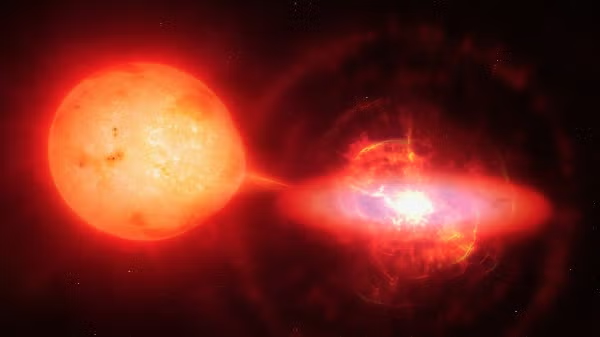The search for life in the universe to be focus of national conference in April
For the first time, Arizona will be hosting the nationally recognized Astrobiology Science Conference (AbSciCon), bringing together scientists from across the country to report on new discoveries and to share insights in the search for life on other planets.
“We're excited that the search for signs of life in the universe is increasingly geared towards exoplanets, which is a central part of our research at ASU,” said School of Earth and Space Exploration (SESE) Professor Steven Desch, who is chairing the conference. “And of course we're thrilled to be hosting the meeting in Arizona, to showcase the Southwest and ASU to our colleagues.”
The conference, which will be held at the Mesa Convention Center April 24–28, will feature a variety of astrobiology topics including the possible habitable conditions on Europa and other icy worlds, whether extreme environments on Earth are valid analogs to sites on Mars, the evolution of biogeochemical cycles and environment on Earth and other planets, and if habitable “water world” exoplanets are good places to look for signatures of life.
Highlights of the conference include a public discussion from the Origins Project at ASU and ASU Planetworks on how astrobiology informs our perspective of Earth as a planet, a panel discussion on alien life from ASU’s BEYOND Center, and a "Meet the Scientists" session, featuring experts who combine geology with organic chemistry to understand how life might have originated here on Earth, and how it might look if encountered elsewhere.
“For those who have never looked at ancient rocks, touched meteorites, or seen pieces of the Moon and Mars, this is your chance,” said Steve Benner of the Foundation for Applied Molecular Evolution.
In addition to the main conference, AbSciCon is offering an “Early Career Scientist” Pre-Conference School on the ASU Tempe campus April 22 and 23. Instructors will teach short “primer” classes on astronomy, planetary science, and biology to help early career scientists specializing in one field get up to speed on other fields. The pre-conference will also include workshops on science communication, proposal writing, and how to apply for jobs in academia.
AbSciCon offers graduate and undergraduate students the opportunity to participate in the student poster competition, sponsored by the NASA Astrobiology Institute. Posters will be judged on originality of research, the impact to the field, and the quality of the presentation, with awards ranging from $500 to $1,000.
High school and community college students have also been invited to participate in the AbSciCon Student Mentorship Program. Up to 30 students from underserved areas of Arizona have been selected to shadow a faculty mentor and participate in the conference.
“While AbSciCon is an important event to communicate our research results to other scientists and to hear what progress is being made in the search for life in the universe, we also want to prepare the next generation of scientists to step into the role of 21st century research,” Desch said. “We're proud to be able to offer this training through the Student Mentorship Program and the Pre-Conference School.”
AbSciCon annually provides a forum for reporting on new discoveries, sharing data and insights, advancing collaborative efforts, planning new projects, and educating the next generation of astrobiologists. The conference will feature plenary sessions on current and thought-provoking topics, topical sessions, evening programs, and public and educational events.
Along with Desch, the scientific organizing committee also includes SESE’s Ariel Anbar, Hilairy Hartnett, and Sara Imari Walker, and colleagues from George Washington University, UC Riverside, Georgia Tech, Harvard and NASA, among others.
AbSciCon sponsors include the Earth Life Science Institute, Blue Marble Space Institute, SmartSparrow, ASU’s College of Liberal Arts and Sciences, SESE, and Qwaltec. The conference is supported by the Lunar and Planetary Institute, the Universities Space Research Association, NASA.
For more information on AbSciCon and the pre-conference for early career scientists, visit: www.hou.usra.edu/meetings/abscicon2017.
More Science and technology

Stuck at the airport and we love it #not
Airports don’t bring out the best in people.Ten years ago, Ashwin Rajadesingan was traveling and had that thought. Today, he is…

ASU in position to accelerate collaboration between space, semiconductor industries
More than 200 academic, business and government leaders in the space industry converged in Tempe March 19–20 for the third annual…

A spectacular celestial event: Nova explosion in Northern Crown constellation expected within 18 months
Within the next year to 18 months, stargazers around the world will witness a dazzling celestial event as a “new” star appears in…

